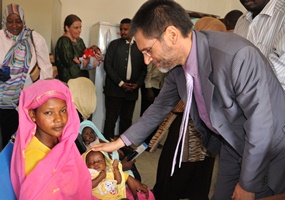Pneumococcal disease is an infection caused by the bacteria Streptococcus pneumoniae that causes several serious illnesses, including: bacterial meningitis, pneumonia, otitis media or an inner ear infection, bacteremia, as well as sinus infections. Infection with pneumococcus is a major cause of morbidity and mortality worldwide. In Sudan, the incidence of pneumonia among under five children is 19% and it represents 27% of hospital admission causes. Pneumonia is also responsible for 10% of hospital deaths among under-five children, and is the second major cause of death after septicemia.
Today’s event represents a major step forward in Sudan’s efforts to improve the health of its future generations. With GAVI Alliance support since 2001, Sudan has been able to introduce various vaccines against childhood diseases, including hepatitis B, Hib (haemophilius influenza type b) and rotavirus.
WHO and UNICEF commit to decrease disabilities and deaths from vaccine preventable diseases, a shared major strategic objective with the Ministry of Health.
 WHO Representative in Sudan Dr Anshu Banerjee said that all efforts will be exerted to reach infants even in areas challenged by security issues.“We hope to reach infants even in areas challenged by security issues. We cannot compromise lives especially those of children. With support from Government and partners, we will work to make sure that no single child in this country will be deprived from vaccination,” WHO Representative in Sudan Dr Banerjee says.
WHO Representative in Sudan Dr Anshu Banerjee said that all efforts will be exerted to reach infants even in areas challenged by security issues.“We hope to reach infants even in areas challenged by security issues. We cannot compromise lives especially those of children. With support from Government and partners, we will work to make sure that no single child in this country will be deprived from vaccination,” WHO Representative in Sudan Dr Banerjee says.
“Every Sudanese child has a right to health and the best possible start in life. The PVC13, along with the full regimen of life-saving vaccines, is a key intervention to make sure that children are indeed given the best possible start and a fighting chance to survive in good health. Like WHO, UNICEF is committed to support the Government and people of Sudan to make sure that every child is reached with vaccination services,” says Mr Geert Cappelaere, UNICEF Representative, Sudan.
A comprehensive plan for the introduction of the new vaccine has been developed covering all components related to vaccination strategy, along with vaccine management, monitoring and evaluation, and financing. A post introduction evaluation will be conducted by WHO, UNICEF and other implementing partners.


